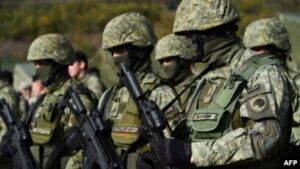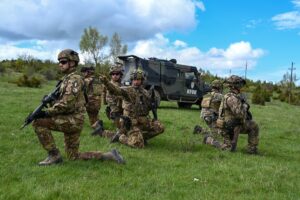The mission tasked to ensure Kosovo’s security has denied the Deputy Minister of Defense’s statement regarding supposed joint activities in the north between the Kosovo Security Force and KFOR.
On March 26, 2024, during the “CLICK” show on RTV21, Deputy Minister of Defense Shemsi Syla, discussed the 25th anniversary of NATO’s intervention in Kosovo. In his discussion about the relations between KFOR and the KSF, he mentioned that they had joint activities in northern Kosovo.
“We have had joint activities in the northern part, it’s not like our soldiers weren’t there,” Syla stated.

Foto: FSK
Currently, there is an agreement between Kosovo and NATO, still in effect, which was signed by former Prime Minister Hashim Thaçi and NATO Secretary General Jens Stoltenberg. According to this agreement, Kosovo cannot deploy its army in the north without the special permission of the KFOR Commander.
In the interview, Syla addressed the existing agreement, acknowledging its presence but also implying that adherence to it might vary should new circumstances arise: “But we must understand that in a different situation when it has happened, a document was written, but it doesn’t mean that this document will always apply in other situations that are arising and being created. There was a time when such a document was written, but it doesn’t mean it will always be that way,” Syla expressed. Discussing meetings with KFOR, he added that the Constitution obligates them to protect every part of the country.
“Neither north nor south is mentioned, but to be ready. These are complex, sensitive issues, but they are real and need to be discussed, and we must consider in extraordinary situations what actions should be taken, but always in coordination, not on our own,” he emphasized.
However, KFOR has denied having joint activities with the Kosovo Security Force (KSF) in the north.
In a written response to Sbunker, they stated that any deployment of the Kosovo Security Forces in northern Kosovo requires the approval of the KFOR Commander.
“We welcome the ongoing commitment of the institutions in Kosovo to respect this commitment. We expect timely consultations for any actions by the Kosovo Security Force or the Kosovo Police that might affect regional security,” the KFOR response noted.
While they emphasized that there have been no joint KFOR-KSF activities, they highlighted the engagements their teams have with security mechanisms in the country. “The NATO Advisory and Liaison Team, which is a separate entity within KFOR, continues to support the further development of security organizations in Kosovo through capacity-building activities, education, and coordination of training, primarily in accordance with the Kosovo Security Forces’ civil emergency mandate,” the response stated.

Foto: KFOR
After the extraordinary elections in northern Kosovo on April 23, 2023, where Albanian mayors won for the first time due to a Serbian boycott, tensions. escalated. On May 29, 2023, KFOR was involved in managing a crowd of violent protesters in Zvečan, who opposed the installation of Albanian mayors in municipal buildings. The fragility of the situation in the north peaked with a terrorist attack on September 24 in Banjska, Zvečan, where Afrim Bunjaku, a Kosovo Police officer, was killed. On the side of the attackers, led by the former vice president of the Serbian List, Milan Radojčić, three members were left dead, while the rest fled to Serbia. Following this incident, KFOR increased its troop numbers and intensified patrols around the Kosovo-Serbia border.
Based on its current mandate, KFOR is the third responder after the Kosovo Police and EULEX.
“KFOR will do everything necessary to provide a secure environment and free movement for all people living in Kosovo – based on United Nations Security Council Resolution 1244 from 1999, at all times and impartially. KFOR is the third security responder after the Kosovo Police and the EU’s Rule of Law Mission (EULEX), which are the first and second responders, respectively, with whom we closely coordinate our activities,” states the response from KFOR.
NATO and the EU are urging that disputes between parties be resolved and tensions be overcome through the Brussels Dialogue, which until now has been overshadowed by tensions in the north.
*This article is published as part of the Western Balkans Regional Initiative against disinformation. Western Balkans Anti-Disinformation Hub: exposing malign influences through watchdog journalism.



